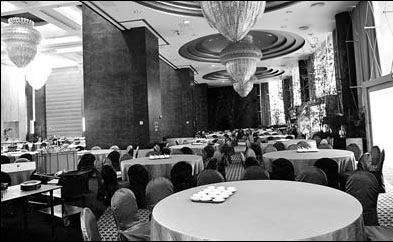Hotels feel the pinch as banquet business slumps
Updated: 2013-01-31 07:42
By Wang Wen (China Daily)
|
||||||||
|
A banquet room at a five-star hotel in Guangzhou, Guangdong province. Provided to China Daily |
Banquet divisions in some luxury hotels are looking for new clients because of a sharp drop in bookings ahead of Spring Festival, the peak season for the industry.
The fall in bookings follows moves announced by the central government last month to combat extravagance and corruption.
"All banquet bookings at our hotel have been canceled," said a staff member from the banquet division at the Beijing Friendship Hotel, a hotel designated for government conferences.
He said the hotel catered for at least two or three banquets a week during peak season in the past, but the number has fallen to zero this year.
Clients - mainly government departments and State-owned enterprises - canceled their bookings in response to the new government regulations. It had been tradition for government departments to hold annual "greeting meetings" in high-end hotels before Spring Festival.
The Beijing Friendship Hotel spokesman said: "The cancellations are too sudden and we do not have a way to make up the losses yet. My team is trying its best to look for other clients."
A five-star hotel in Hangzhou, Zhejiang province, said it received 10 banquet cancellations before Spring Festival, as a result of the new regulations, and many clients had also decided to cut back on greetings events for the holiday.
"The loss is sizable," the hotel's manager, who declined to be identified, told China Daily.
However, although hotels have been hit hard, some business insiders have welcomed the changes.
"Business is not as good as last year definitely, but it means the industry is going back to a real commercial business," said Song Guojing, general manager of Beijing Hot Spring Leisure City, a hot spring resort.
The market was abnormal, as the room occupancy rate at the resort was almost 100 percent at the end of the year, Song said, adding that such brisk business had been supported by public funds.
"Now, public funds have been withdrawn from the market and it is back to a normal operating environment for hotels," Song added.
Wang Jianmin, a researcher at the Tourism Research Center of the Chinese Academy of Social Sciences, said: "Canceled bookings from government departments have exposed the problem for domestic hotels."
High-end hotels in China had depended excessively on government consumption in the past, Wang said, adding that international chain hotels now had an advantage as they are not hit by the new regulations.
Wang added: "This year's drop in bookings may be an opportunity to push hotels to change their operating methods and search for new clients."
High-end hotels were "too removed" from residents and had limited themselves to fixed consumer groups in the past, Wang said. "The hotels should launch promotions and interact more with residents," he suggested.
The marketing director at a German-run hotel in Beijing said: "Consumption by government officials and institutions only contributes a very tiny part to our operations, and the hotel's performance has not been affected."
Wang Jian, spokesman for the Guangdong branch of China Travel Services, said travel firms' restaurant business had also been affected ahead of Spring Festival.
Their tours business, especially that depending heavily on institutional clients, is also likely to be affected in spring and summer, he said.
Leisure travel using public funds had fallen even before the new government regulations were announced as people kept a close watch on consumption by government officials and public institutions. Wang Jian said that to cope with the change, tour companies should work to attract more individual travelers, which has become a trend worldwide.
Li Wenfang in Guangzhou contributed to this story.
wangwen@chinadaily.com.cn
(China Daily 01/31/2013 page17)

 In Photos: 7.0-magnitude quake hits Sichuan
In Photos: 7.0-magnitude quake hits Sichuan
 Li Na on Time cover, makes influential 100 list
Li Na on Time cover, makes influential 100 list
 FBI releases photos of 2 Boston bombings suspects
FBI releases photos of 2 Boston bombings suspects
 World's wackiest hairstyles
World's wackiest hairstyles
 Sandstorms strike Northwest China
Sandstorms strike Northwest China
 Never-seen photos of Madonna on display
Never-seen photos of Madonna on display
 H7N9 outbreak linked to waterfowl migration
H7N9 outbreak linked to waterfowl migration
 Dozens feared dead in Texas plant blast
Dozens feared dead in Texas plant blast
Most Viewed
Editor's Picks

|

|

|

|

|

|
Today's Top News
Live report: 7.0-magnitude quake hits Sichuan, heavy casualties feared
Boston suspect cornered on boat
Cross-talk artist helps to spread the word
'Green' awareness levels drop in Beijing
Palace Museum spruces up
First couple on Time's list of most influential
H7N9 flu transmission studied
Trading channels 'need to broaden'
US Weekly

|

|








